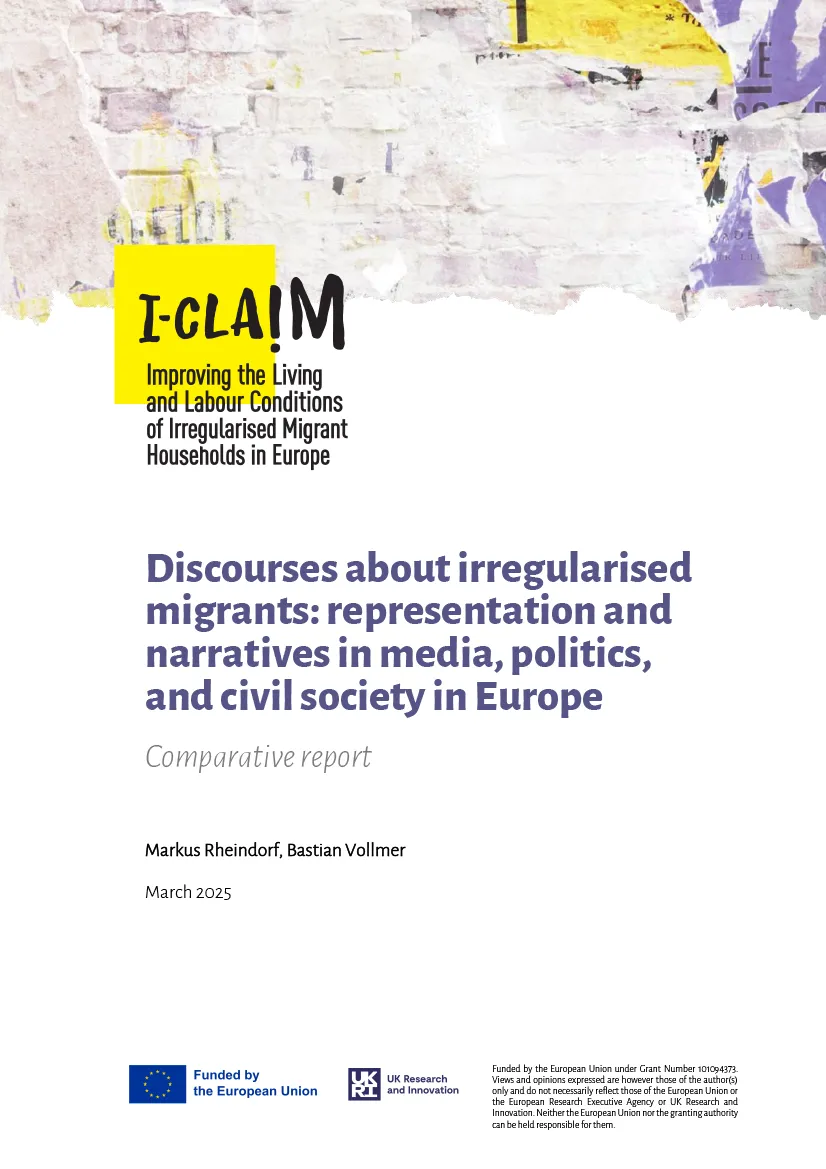Discourses about irregularised migrants: representation and narratives in media, politics, and civil society in Europe. Comparative report
Markus Rheindorf, Bastian Vollmer
How to cite:
Rheindorf, M.,Vollmer, B. (2025). Discourses about irregularised migrants: representation and narratives in media, politics, and civil society in Europe. Comparative Report. I-CLAIM.
Discourses about irregularised migrants: representation and narratives in media, politics, and civil society in Europe. Comparative report
Markus Rheindorf, Bastian Vollmer
Migration remains a defining issue in Europe, shaping policy, media narratives, and civil society advocacy. This report compares migration discourse across seven contexts—Germany, Finland, the Netherlands, Italy, Poland, the UK, and the EU—analysing how irregular migration is framed in politics, media, and civil society. By identifying dominant themes, linguistic patterns, and ideological contestations, it highlights the polarized ways migration is discussed across Europe.
Media discourse varies widely, often reflecting political priorities. In Poland and the UK, migration is framed as a security threat, with crisis rhetoric and border enforcement focus. Italian media emphasize humanitarian concerns, particularly Mediterranean crossings and migrant labour exploitation. German, Finnish and Dutch media adopt a policy-oriented approach, discussing migration within governance and legal frameworks. Crisis narratives persist across all contexts, reinforcing perceptions of migration as an urgent challenge rather than a long-term issue.
Political actors use migration discourse to align with electoral concerns. Right-wing parties in Poland, the UK, and Italy focus on securitization and border control, while left-leaning parties in Germany, Finland, and the Netherlands emphasize integration, legal pathways, and labour contributions. At the EU level, migration is framed through governance and regulation, though securitization remains prevalent, especially regarding border management and returns.
Civil society actors counter securitization and crisis rhetoric, advocating for human rights and economic contributions. NGOs and advocacy groups in Germany, Finland, and the Netherlands focus on legal aid and labour protections, pushing for regularization pathways. In Poland and the UK, civil society efforts resist restrictive migration policies, highlighting the human cost of enforcement. At the EU level, civil society organizations promote rights-based governance, challenging the Commission’s emphasis on deportation and border control.
The analysis reveals stark divergences between national and EU-level discourse. While national governments react to electoral pressures and short-term crises, EU discussions prioritize governance, burden-sharing, and legal harmonization. This tension complicates efforts to develop a cohesive migration policy. Gendered narratives also shape discourse, with women and children framed as vulnerable and young men—especially from Africa and the Middle East—linked to security risks.
Understanding migration discourse is critical for balanced policymaking. Securitization and crisis narratives drive restrictive policies, while greater focus on legal pathways and integration could counterbalance security-driven framings. EU migration policy must align national concerns with a rights-based approach. This report underscores the need for informed debates and sustainable migration policies beyond crisis-driven responses.
